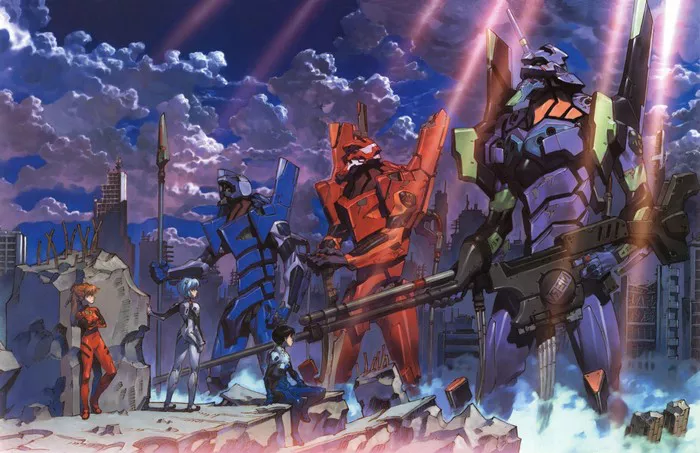Neon Genesis Evangelion, a seminal anime series that has captivated audiences since its debut in the 1990s, is renowned for its complex characters, intricate plotlines, and profound themes. Among the enigmatic figures that populate the world of Evangelion, few are as mysterious as Adam. In this article, we delve into the depths of Evangelion lore to unravel the identity and significance of Adam, shedding light on this elusive character that plays a pivotal role in the series.
The Mythos of Evangelion
An Overview of the Series
Neon Genesis Evangelion, created by Hideaki Anno, is set in a post-apocalyptic world where humanity faces existential threats from mysterious beings known as Angels. The story follows Shinji Ikari, a reluctant teenager who becomes a pilot of a giant bio-mechanical robot called an Evangelion, tasked with defending humanity against the Angels. As the series unfolds, it delves into themes of identity, existentialism, and the nature of consciousness, captivating viewers with its thought-provoking narrative.
The Role of Adam in Evangelion Lore
Adam is a central figure in the mythology of Neon Genesis Evangelion, serving as a catalyst for the events that unfold throughout the series. Referred to as the “First Angel,” Adam is shrouded in mystery, with his true nature and origins remaining a subject of speculation and intrigue. As the story progresses, revelations about Adam’s significance emerge, offering tantalizing glimpses into the complex mythology of Evangelion.
Themes of Creation and Destruction
At its core, Neon Genesis Evangelion explores themes of creation and destruction, with Adam embodying these dichotomous forces. As the progenitor of the Angels, Adam represents the potential for both salvation and annihilation, serving as a symbol of humanity’s capacity for greatness and its propensity for self-destruction. Understanding Adam’s role in the series requires delving into the philosophical underpinnings of Evangelion and grappling with its existential themes.
Unraveling the Identity of Adam
Adam as the Progenitor of Angels
In Evangelion lore, Adam is depicted as the progenitor of the Angels, a race of otherworldly beings that threaten humanity’s existence. According to the series’ mythology, Adam is one of two “Seeds of Life” sent to Earth by the mysterious organization known as the “First Ancestral Race.” The presence of Adam on Earth triggers the emergence of the Angels, setting the stage for the conflict that drives the narrative of Evangelion.
Adam’s Origins and Origins
The origins of Adam are shrouded in mystery, with conflicting accounts and interpretations offered throughout the series. Some sources suggest that Adam was created by the First Ancestral Race as part of their experiment to propagate life throughout the universe. Others propose that Adam is an ancient being that predates humanity, existing long before the arrival of the First Ancestral Race. The ambiguity surrounding Adam’s origins adds to his enigmatic allure and fuels speculation among fans.
The Human Connection: Adam and Lilith
In addition to Adam, another key figure in Evangelion lore is Lilith, often referred to as the “Second Angel.” Lilith serves as the progenitor of humanity, with Adam and Lilith representing two distinct branches of life on Earth. According to the series’ mythology, Adam and Lilith are linked in a symbiotic relationship, with their interactions shaping the course of human evolution and the fate of the world. Understanding the connection between Adam and Lilith is essential to unraveling the deeper mysteries of Evangelion.
Significance of Adam in Evangelion
Catalyst for Conflict
Adam’s presence on Earth serves as a catalyst for the conflict between humanity and the Angels, driving the narrative tension that propels the series forward. As the source of the Angels’ existence, Adam represents a fundamental threat to humanity’s survival, leading to desperate attempts by the protagonists to neutralize the threat posed by his awakening.
Symbol of Power and Destruction
Throughout Evangelion, Adam is portrayed as a symbol of power and destruction, embodying the potential for both salvation and devastation. His immense power and formidable presence evoke awe and fear in equal measure, underscoring the existential threat posed by the Angels and the perilous nature of the world in which the characters inhabit.
Catalyst for Evolution
Despite his ominous reputation, Adam also represents the potential for evolution and transformation. His interactions with Lilith and humanity catalyze profound changes in the fabric of reality, leading to shifts in consciousness and the emergence of new possibilities. In this sense, Adam serves as a catalyst for evolution, pushing the characters and the world of Evangelion towards a new paradigm of existence.
Conclusion: Deciphering the Legacy of Adam
Adam’s enigmatic presence looms large over the world of Neon Genesis Evangelion, embodying themes of creation, destruction, and the inexorable march of evolution. As the progenitor of the Angels, Adam plays a pivotal role in shaping the fate of humanity and the destiny of the world. Yet, his true nature remains elusive, inviting speculation and interpretation from fans eager to unravel the mysteries of Evangelion’s mythology. Whether viewed as a symbol of power and destruction or a harbinger of evolution and transformation, Adam leaves an indelible mark on the series, ensuring his place in the pantheon of iconic characters that populate the world of Evangelion.

